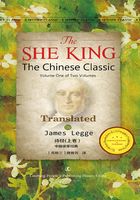
HEUNG CHE
1 The male pheasant flies away
Lazily moving his wings.
The man of my heart!—
He has brought on us this separation.

聖=叡, 'wise'. 善 and 令 are synonyms. Lëw Kin (劉瑾; Yuen dyn.) says:—'The former stanza speaks of the genial wind, and the heart of the jujube tree, but afterwards does not mention what was in the poet's mind corresponding to these things, so that the verse is metaphorical. This stanza speaks of the wind and jujube tree, and then mentions the mother and the sons which correspond to these, so that it is allusive. There is a similarity between the two, but they are not of the same character.'
St.3. 爰,—see on st.3 of last ode. Tseun was a city of Wei,—in the pres. Puh Chow, dep. Ts'aou-chow,Shan-tung. Near it was a famous spring, to the virtue of which the sons refer as a contrast to their own uselessness. The spring refreshed the people of Tseun, while they could not keep their mother from trouble and pain.
St.4. 睍睆 is explained by Maou as meaning 好貌,'good-like'. Choo understands the phrase of the notes of the orioles, 'clear and twirling'. It may be doubted if either of them have brought out the meaning correctly.One would expect some description of the eyes in the characters. 載 must be taken simply as a particle. Wang Yin-che explains it by 則, but there is not that force of meaning in it. The birds were useful in their way,contributing to the pleasure of men; but the sons failed to comfort their mother's heart. The old interpreters have a great deal more to say on the allusion; but it would be a waste of time and space to dwell on their views.
The rhymes are—in st. 1, 南*, 心 cat. 7, t. 1; 夭, 勞,cat. 2: in 2, 薪, 人, cat. 12: in 3, 下*, 苦, cat. 5, t. 2: in 4,音, 心, cat. 7, t. 1.
Ode 8. Allusive and narrative. A WIFE DEPLORESTHE ABSENCE OF HER HUSBAND, AND CELEBRATES HIS VIRTUE. The 'Little Preface'says that this ode was composed by the people of Wei against duke Seuen,—the marquis (晉), called to the rule of the State on the death of Chow-yu (B.C.718—699). His dissoluteness and constant wars distressed and widowed the people, till they expressed their resentment in this ode.

2 The pheasant has flown away
But from below, from above, comes his voice,
Ah! the princely man!—
He afflicts my heart
3 Look at that sun and moon!
Long, long do I think.
The way is distant;
How can he come to me?
4 All ye princely men,
Know ye not his virtuous conduct?
He hates none; he covets nothing;—
What does he which is not good?


Choo well observes that there is nothing in the piece about the dissoluteness of duke Seuen, or to indicate that it was made in his time; that we ought to not to hear in it the voice of the people, but of a wife deploring the absence of her husband. The imperial editors in this case fully agree with him.
Stt. 1, 2, L1. 1, 2. 於 is the particle. 泄泄 describes the slow flight of the pheasant moving, not under alarm, from one place to another. So, l. 2 in st. 2, is understood to shew the feeling of security enjoyed by the bird. Yen Ts'an observes that here, in v.VL., and some other odes, where the subject is an officer engaged on military duty, the male pheasant is introduced, because of the well-known fighting character of that bird. It may be so; but here it is the contrast between the ease and security of the pheasant and the toils and danger of her husband, which is in the speaker's mind. 我之懷=我懷人 in I. i. III. 1. 伊is the particle. K'ang-shing says it should be 繄, and explains it by 'this';—which is unnecessary. 阻 means'to hinder', 'to obstruct'; hence 'an impediment', that by which communication is prevented. Here Choo explains it by 隔, 'to be separated'. This is better than Maou's 難, 'difficulty', 'hardship'. 詒=遺, simply= 'to occasion'. There is some difficulty with the 自. Yen Ts'an's reference of it to the speaker—the wife—is inadmissible. 'She attributes', says Foo K'wang, 'their separation to her husband, not wishing to blame others for it'. 君子 denotes the husband,—as in i.X., et al. 展=誠, 'sincere', 'sincerely'. Choo observes that the 展 and實 give strong emphasis to these lines of st. 2.
Stt. 3, 4. These are simply narrative. The sun and moon are spoken of as the measurers of time. Many revolutions had they performed since the husband went away. The 云 in ll. 3 and 4 is merely a particle. It is found both at the beginning and in the middle of lines. Wang Yin-che says on this passage, 云, 語中助詞也, 詩雄雉曰, 道之云遠, 曷云能來, 言道之遠, 何能來也. Lacharme, endeavouring to translate the 云,has,—'Viam longam esse aiunt; quid igitur memoranteum advenisse posse!'

